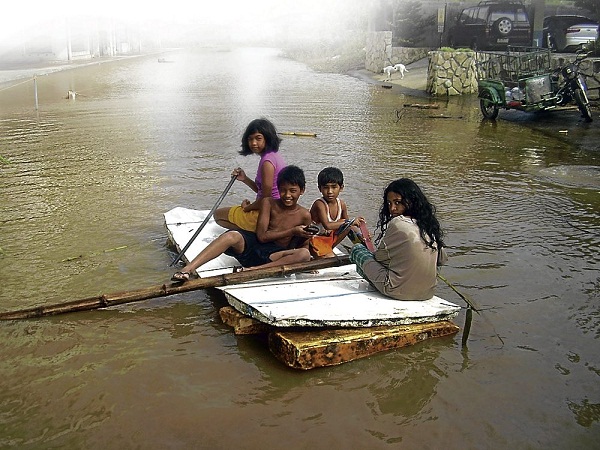
AS LONG AS THEY FLOAT Rafts and boats for flood victims come in all shapes and sizes, as shown here by some enterprising residents in Cainta, Rizal province. PHOTO BY CENON BIBE
What do banana trunks, plastic drums, inflatable beds and discarded styrofoam packages have in common?
They can showcase Filipino ingenuity and entrepreneurship especially in times of need, like when massive floods isolate residents of gated communities from the outside world.
At the height of last week’s monsoon floods in Cainta, Rizal province, when even the biggest trucks could not pass through the inundated roads, young men earned thousands of pesos ferrying residents between their homes and the main thoroughfare Felix Avenue (formerly Imelda Avenue).
They came out ready to get wet and offered a fleet of boats and rafts made from the oddest of materials.
Rene, 21, was one of about 20 boatmen who helped people make it across the waist-deep flood along the avenue and into Village East Subdivision in Barangay Sto. Domingo where the water rose to the chest.
Like most of the boatmen, Rene lived on the poorer fringes of the subdivision. When the heavy downpour submerged a third of the village, they lost their day-wage jobs mostly as construction workers or helpers—but instantly found a source of income in the very waters that put many other lives at a standstill.
“Kayo na po ang bahala (It’s all up to you),” Rene said, referring to the fare, after getting a passenger onboard his vessel: A plastic drum cut into two to form tubs held together with wire, dos por dos lumber and roof sealant. A wooden plank provided seating for up to four people.
He said commuters usually gave P20 to P100 each for the nearly kilometer-long trip between Felix Avenue up to the village clubhouse.
Wading in waist-deep waters in front of Holy Trinity Parish inside the subdivision, Andy, who offered a boat similar to that of Rene’s, recalled that one generous woman paid him P500 on Wednesday.
He ferried her from the village clubhouse, which served as the boat “terminal,” to Ortigas Avenue Extension which was about four kilometers away.
The subdivision of 2,500 households sits at the juncture of two creeks flowing from Antipolo City and emptying into Cainta River.
On occasion, like during the onslaught of Tropical Storm “Ondoy” in 2009 and last week’s flooding, a part of the usually vibrant village goes underwater and is cut off from the rest of Cainta.
But like its ingenious boatmen, many Village East residents refuse to be trapped and look for ways to keep on going. They find many of their enterprising neighbors helpful in such situations.
Aside from getting soaked for hours, the boatman’s journey could be fraught with other hazards. Rene said he had to endure the pain of stepping on sharp rocks and other unseen obstacles. At times, he had to fight strong currents to keep his improvised boat from drifting away.
But the payoff was all worth it. As of Thursday afternoon, Ramonito, 17, said he had already earned about P3,000 since early Tuesday. He offered rides on his Intex inflatable bed.
On normal days, most of these men earn around P400 for eight hours of labor in one of the many construction sites in the subdivision.
“This opportunity only comes once in a while,” said another raft pilot who had been practically in the water for three days and had begun feel the chill. “A nap would do to keep me going.”
Others cleverly built boats or rafts made of banana trunks or bamboo poles held together with rope. Others fashioned theirs out of styrofoam blocks and even an old bathtub.
Three teenage boys, for example, collaborated and produced something that looked like a floating bean bag packed with pieces of styrofoam.
The paying riders didn’t seem to mind what shape these floaters took, as long as they can keep them safe and dry.
Business only began to take a dip Thursday night when the rains finally stopped, the floods started to subside, and 10-wheel trucks and light vans started to reclaim the boatmen’s routes.
By nightfall, Rene and the others were no longer needed. But they will surely spring back to action when needed, perhaps with more ingenious rides, to make life for flood victims a little more bearable.